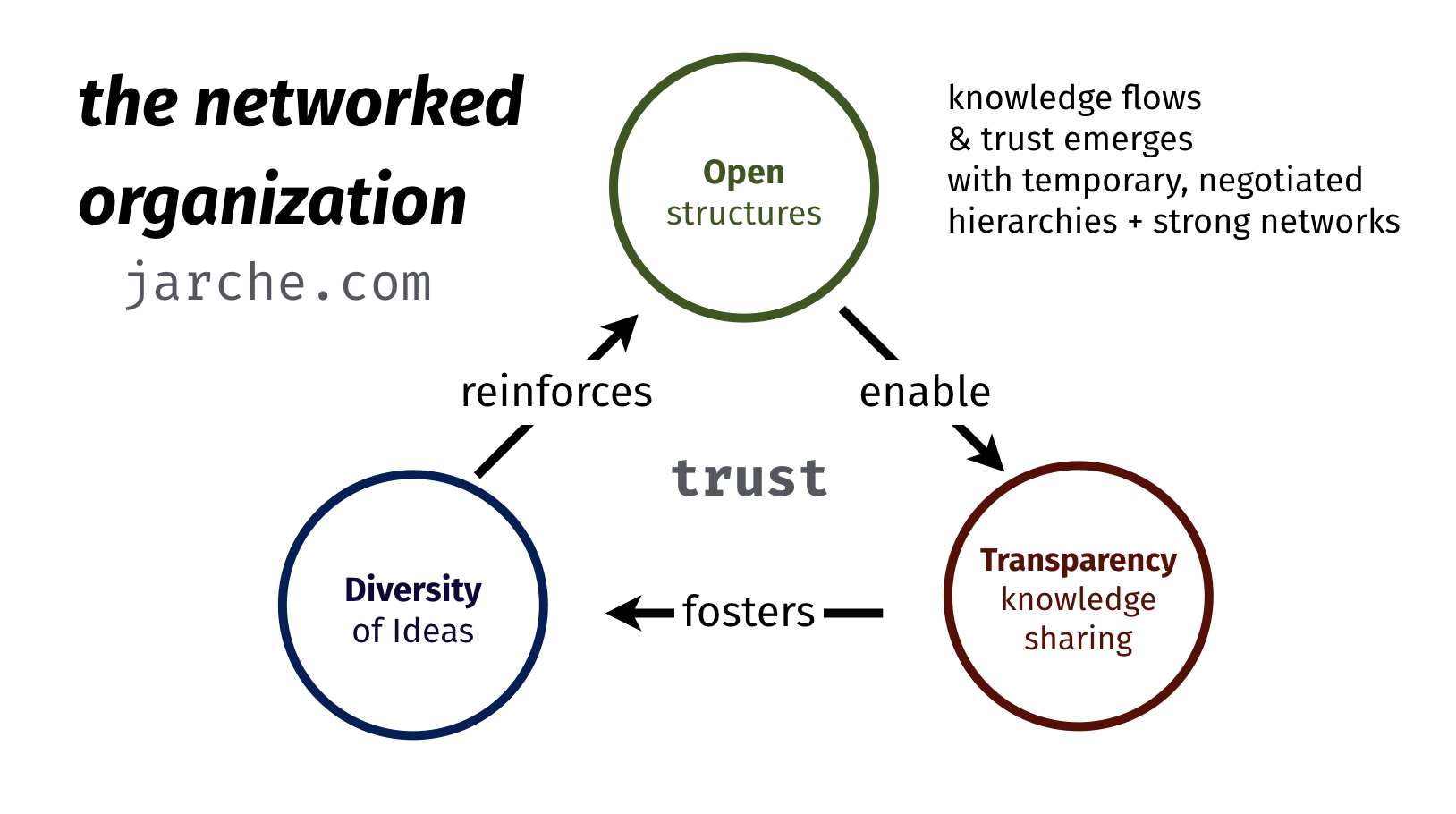When trust is lost, knowledge fails to flow. When knowledge flow is stemmed, trust is lost. There is widespread outcry in China over the death of Doctor Li Wenliang who identified the novel corona virus, was reprimanded by the police for discussing it in public, and then died from the virus.
“For many people in China, the doctor’s death shook loose pent-up anger and frustration at how the government mishandled the situation by not sharing information earlier and by silencing whistle-blowers. It also seemed, to those online, that the government hadn’t learned lessons from previous crises, continuing to quash online criticism and investigative reports that provide vital information.” —NYT 2020-02-07
Contrast this with the sharing of research about the virus and how to counter it among the global medical and immunology communities. Researchers in one time zone work all day and then pass off their findings to teams on the other side of the earth. It’s a 24/7 example of working out loud and learning as the work.
Consider any organization that has separation between departments who may officially have the same objectives but their internal directions are at cross-purposes. The tighter our control, then the weaker is our ability to learn and adapt, as Gillian Tett describes in The Silo Effect, “The paradox of the modern age, I realized, is that we live in a world that is closely integrated in some ways, but fragmented in others. Shocks are increasingly contagious. But we continue to behave and think in tiny silos.” We think we are insulated in our silos while contagion rapidly spreads around us.
Breaking down barriers to knowledge flow should be of prime importance for anyone in a leadership position. Leadership is helping make the network smarter. Networks in which knowledge is more visible and flows faster are able to learn faster and better. The example of this epidemic should hit executives in the gut and get them to seriously reexamine every single control mechanism that stifles the flow of knowledge or fails to foster trust among workers.
Openness enables transparency and knowledge-sharing, which fosters diversity of opinions, and these reinforce social networks. Over time, trust emerges.
Follow-up post — leadership through cooperation



Hi Harold:
I’m totally with you on the basic mechanism here. I do believe that trust is vital for social networks to thrive and when it is present, networked learning increases trust. I think the real lynchpin is in the information allowed into the system and the social validity that information can achieve. Unfortunately, we can see a negative version of that being played out here in America. If you can subvert or at least call into doubt information – say, it was Ukraine, not Russia who tampered with US elections – and you have enough of the social network that will repeat this information as being true, you can subvert the network effect that normally would hone down falsehoods to leave the truth standing free.
You are right in praising the social network for honing down he falsehoods China was building to hide the epidemic, but it’s also clear that it was close to succeeding if it weren’t for Doctor Li’s death. Social networks can give credence to falsehoods and erode trust.
Social networks enable knowledge-sharing but don’t guarantee that the knowledge shared is truthful. Healthy social networks with authentic, service-oriented leaders; that welcome dissent and questioning of current knowledge; and are open to change will tend to weed out falsehoods, build trust in the network and its members, and provide knowledge that can be trusted to the point other networks may test it and revise it.
But there are social networks whose leaders are self-serving; whose members fail to question “known” knowledge – either out of convenience or by coercion; and are resistant to change what they hold to be true. These networks will seldom issue information that is “true” but with propaganda, diffusion, and bluster to cover the fact that they haven’t vetted this information against all other information they put on a charade of network behavior that seems to generate truth.
I guess what I’m saying is that your model holds well with the assumption of health social networks. What it doesn’t address is when the system has been corrupted and unhealthy social networks begin to change the equation. The challenge is how can we stem the influence of unhealthy social networks – without trampling on their rights to believe what they believe.
Thanks for your wisdom on this important aspect of networks and how they can drive us forward.
Dave
Thanks, Dave. There is a dark side to networks as there is a dark side to communities — https://jarche.com/2019/07/the-dark-side-of-communities/
We need both open networks and safe communities to make sense of the world together — https://jarche.com/2019/03/constant-outrage/
Harold:
Good post. it makes me conclude that a determinant test for a leader is what is the knowledge flow index of his team? Lack of knowledge flow in a group shows an everyone-for-oneself attitude, ie a group of loose people that can inter-fail repeatedly with knowledge gaps ending up in whatever product or service they are providing. Who would use such product or accept such service ? If only the consumer had a view on the product /service labeling the knowledge flow index .
Thanks for helping with the knowledge flow
Said
I agree, Said, this would be a good way of evaluating leaders.